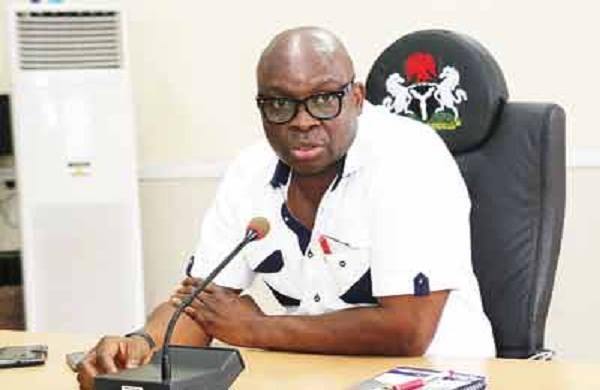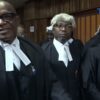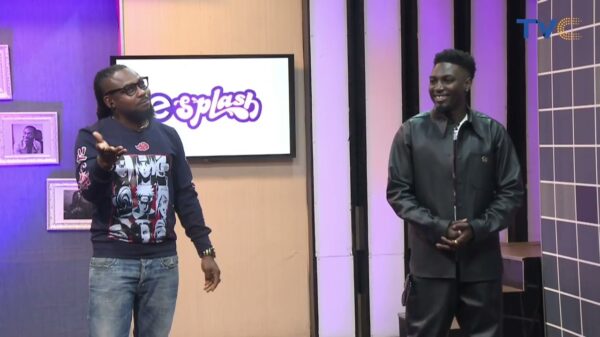 TVC E. Governor Ayodele Fayose of Ekiti State has reportedly asked the Chinese government not to borrow Nigeria $2 billion being sought by President Muhammadu Buhari.
TVC E. Governor Ayodele Fayose of Ekiti State has reportedly asked the Chinese government not to borrow Nigeria $2 billion being sought by President Muhammadu Buhari.
Fayose, who travelled to China on Wednesday, April 13, to attend the 119th China Import and Export Fair, otherwise known as the Canton Fair holding between April 14 and 19, three days after the President left for the country to secure a low interest loan.
In a letter written to the Chinese authority and dated April 12, the governor said: “The government of China should be mindful of the fact that Nigerians, irrespective of their political and religious affiliations are totally opposed to increment of the country’s debt burden, which is already being serviced with 25 per cent of the Federal Government annual budget.”
The letter, with reference number EK/GOV/28/10, was addressed to President Xi Jinping of China and delivered by Chief of Staff to the governor, Barrister Dipo Anisulowo in Abuja on Thursday, April 14, through the Chinese Ambassador to Nigeria, Gu Xiaojie.
According to Fayose, some of the projects for which the loan was being sought were not captured in the controversial 2016 budget.
It was gathered that Fayose will also deliver a copy of the letter directly to the Chinese President.
The letter read in part:
“I write as one of the major stakeholders in the project Nigeria, and a governor of one of the federating units making up Nigeria, to draw your attention to report that the Federal Government of Nigeria is on the verge of obtaining a $2 billion loan from the Export-Import Bank of China.
“This $2 billion loan is part of the N1.84 trillion the Federal Government of Nigeria has proposed to borrow to finance the 2016 budget, which is yet to be signed by the President, Mohammadu Buhari owing to unending controversies between the Executive and Legislative arms of government.
“According to reports, Nigeria desires to raise about $5 billion abroad to cover part of its 2016 budget deficit. This is projected to hit N3 trillion ($15 billion) due to heavy infrastructure spending at a time when the slump in global oil prices has slashed the country’s export revenues.
“While conceding that all nations, especially developing ones need support to be able to grow because no nation is an island, I am constrained to inform you that if the future of Nigeria must be protected, the country does not need any loan at this time.
“The government of China should be mindful of the fact that Nigerians, irrespective of their political and religious affiliations are totally opposed to increment of the country’s debt burden, which is already being serviced with 25 per cent of the Federal Government annual budget.
“It will interest the government of China to know that some of the projects for which the loan is being sought are not captured in the controversial 2016 budget, which has been sent to the President by the National Assembly for his assent. For instance, the Lagos – Calabar Rail project was not included in the budget proposal the President presented to the National Assembly and it was not included in the Appropriation Bill passed by the National Assembly.
“Most importantly, Nigeria is presently servicing debt with about 25 per cent of its annual budget and what will happen to the economy in 2017, when the country will begin to service the additional debt to be incurred this year is better imagined than experienced.
“The Chinese government must also be aware that some western nations approached by the Federal Government for loan diplomatically and cleverly declined.
“This must have been informed by the suspicion in the present government’s capacity to salvage the nation’s economy as well as the sincerity in the fight against corruption. More so that Nigeria’s Foreign Reserve, which is the only guarantee for foreign loan has declined to a very uncomfortable level.”
Anisulowo was accompanied to the Chinese ambassador’s office by Deputy Speaker of the State House of Assembly, HonSegun Adewumi, Chairman House Committee on Information,Gboyega Aribisogan, Chairman House Committee on Health, Dr Samuel Omotosho and Special Assistant to the Governor on Public Communications and New Media, Lere Olayinka.


















